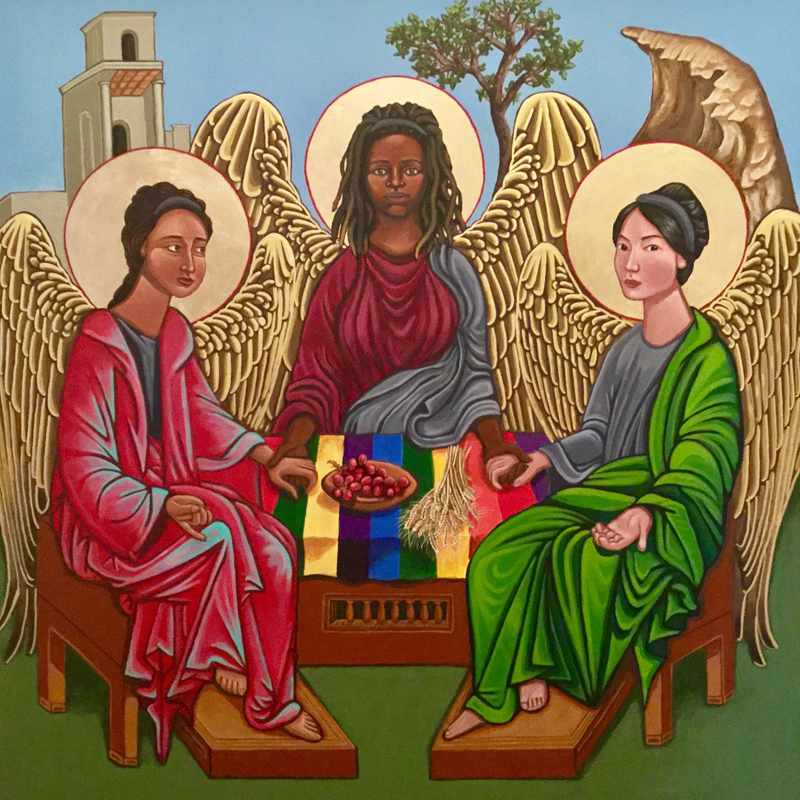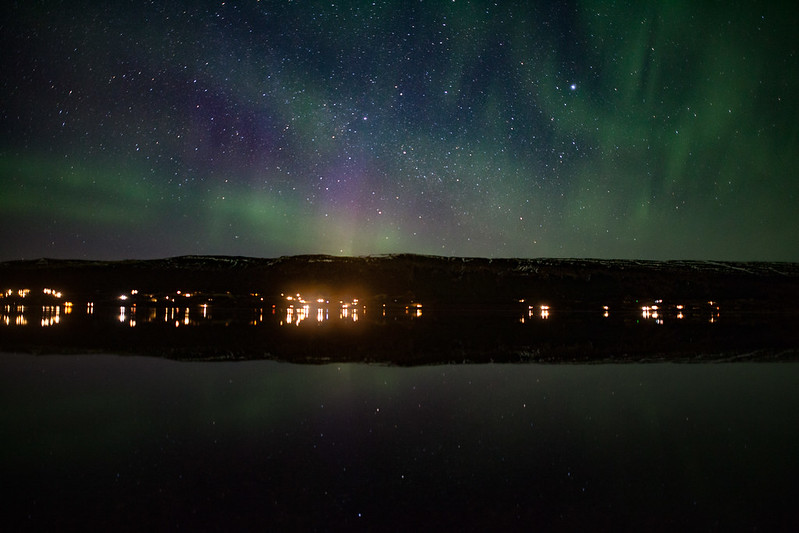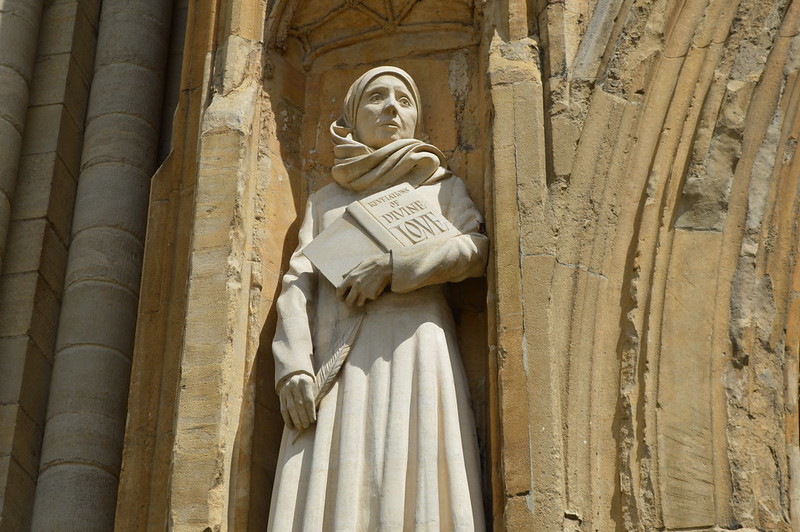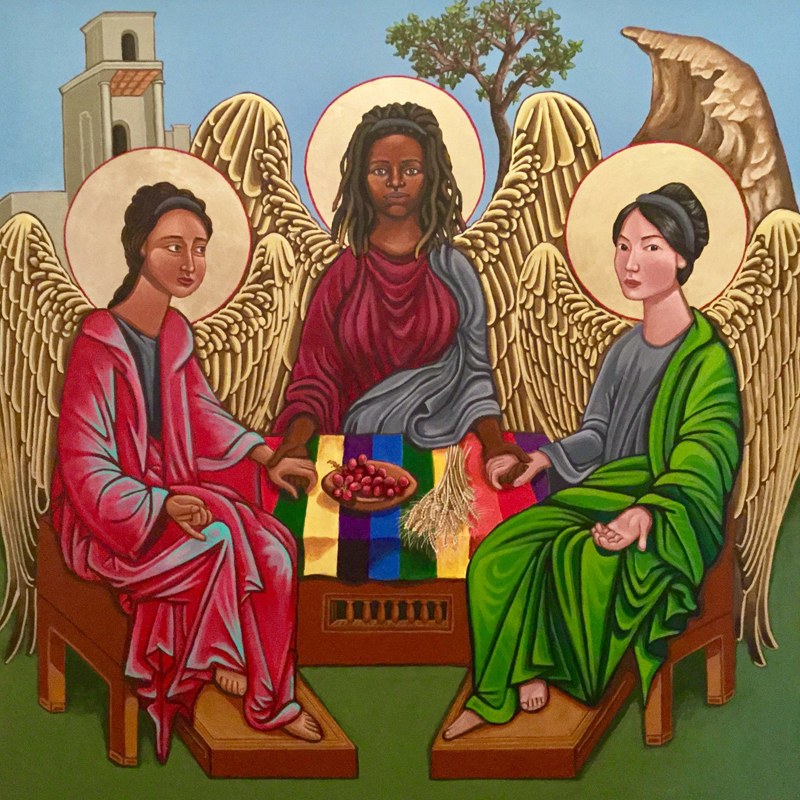
Revised Common Lectionary Reflection, Trinity Sunday, Year B
May 30, 2021
Lessons: Isaiah 6:1-8 Psalm 29; Romans 8:12-17 John 3:1-17
Theme: God’s faithful and generous people understand that God reveals God’s self in many ways; it is up to us to pay attention and to be aware.
Key Scripture: For God so loved the world that he gave his only Son, so that everyone who believes in him may not perish but may have eternal life. Indeed, God did not send the Son into the world to condemn the world, but in order that the world might be saved through him. – John 3:16-17
What do you know about God? What do you understand? What is the nature of God? How do we creatures get to know the God who created us? When you begin to search out answers to these questions it can lead you down a theological rabbit hole or so totally blow your mind that you try to stuff God into a comfortable little box of your own construction, only to be taken out when absolutely needed.
Theologians have been debating the nature of God since the earliest days of the Church. The creeds and the concept of the Holy Trinity bear witness to their efforts. The results of these efforts are all well and good, for they help us “get at” God, to touch the healing hem of Jesus’ garment, to understand something of the vastness of the Creator and the wildness of the Spirit, and to experience the relational aspect of God in the dance of Trinity. Yet still, like Nicodemus, we may wonder, ponder, and seek more. “How can this be?” we ask. “What are we to do with the God we think we know, and the God we know that we cannot know?” Furthermore, getting to the place where the theological rubber hits the discipleship road, “What are we going to do about it, and how then shall we live?”
First of all, we can admit that this side of eternity there is no way we can know the fullness of God, and we can accept that the hints, words, and actions we do experience are enough. We don’t need to know everything. We just don’t. Secondly, we can give thanks for what we do know and experience. Finally, we can seek to align our lives with the God as revealed to us in creation, Word, scripture, and relationship. We can take a hint from the mystics and embrace what we do not know as well as what we do.

One of my favorite ways to experience the vast incomprehensibility of God is through creation. I love to go outside on a dark, clear night and watch the sky. It seems to grow larger the longer I gaze into its velvety darkness. I know that the stars, solar systems, black holes, and constellations are beyond my comprehension even though they bear beautiful witness to the Creator. I embrace that I am somehow connected to every atom and molecule of creation in the cosmic Christ who holds everything together in love and unity. I realize that my creatureliness is intimately connected to the whole of creation across time and space. Mind blowing? Pretty much so. Helpful to understanding the vastness of God? Absolutely! Humbling? You betcha.
I am reminded of century mystic Julian of Norwich (1342-1416 CE), who in her book Revelations of Divine Love, speaks of receiving a revelation of all of creation contained in something as small as a hazelnut. She writes:
“At the same time, our Lord showed me, in a spiritual manner, how intimately he loves us. I saw that he is everything that is good and supports us. He clothes us in his love, envelops us and embraces us. He wraps us round in his tender love and he will never abandon us. As I understand it, he is everything that is good. He also showed me a tiny thing in the palm of my hand, the size of a hazelnut. I looked at this with the eye of my soul and thought: ‘What is this?’ And this is the answer that came to me: ‘It is all that is made.’
“I was astonished that it managed to survive: it was so small that I thought that it might disintegrate. And in my mind I heard this answer: ‘It lives on and will live on forever because God loves it.’
“So every single thing owes its existence to the love of God. I saw that this tiny thing had three properties that were essential to it. The first is that God made it; the second is that God loves it; the third, that God preserves it. But I cannot say what this Creator, Preserver and Lover is. Until I am united with him in my essential being, there will be no true happiness for me – by that I mean that until I am linked to him so closely that there is absolutely nothing between God and me.”

In addition to creation, God reveals the divine nature to us in the Word made flesh and in the words of scripture. This week, for example, we have Jesus’ powerful words in John 3:16-17 about the purpose of God’s sending God’s self as Son into the world. Like Julian experienced creation, it’s all about love.
Love leads to the third major way that God reveals the divine nature to us: relationship. The doctrine of the Trinity helps us understand that God does not operate in a vacuum, that indeed God is relationship itself and invites us to fully participate as adopted children led by the Spirit of God. Yes, we are invited. Yes, we are incorporated into the family of God at baptism and given the gift of the Holy Spirit. No, we can’t fully understand, but we can accept and participate in this wondrous and boundless love that holds everything together.
Our job as leaders, teachers, and preachers is to show this wondrous love and the God beyond all knowing, trusting that the Divine One in Three and Three in One will indeed capture the hearts, minds, and lives of all who come to know the unknowable. Why would we settle for anything less?
In
Worship
Invite congregants to ponder what they wonder about God and
what questions they have. Give them slips of paper to write their questions and
a place to affix them within the worship space. Perhaps give each person a hazelnut and the
quote above from Julian of Norwich to take with them from worship. Invite them
to embrace the mystery and awe that is the God beyond revelation. Our world
needs more mystery and awe, especially as we emerge from our COVID cocoons.
With Youth
What is a mystic? Spend some time discussing this with your youth. Introduce them to mystics from past generations, as well as some modern day mystics like the eleven mentioned in Victor M. Parachin’s book, Eleven Modern Mystics and the secrets of a happy, holy life. Learn more here.
With
Children
This week’s focus verse is Romans 8:14 – For all who are led by the
Spirit of God are children of God.
Can any of you tell me when you received the gift of the Holy Spirit? (Entertain all answers.) Yes! That’s right, on the day of your baptism you received this special indwelling gift of God. You can’t see the Holy Spirit, but sometimes you may feel the work of the Spirit in your life. You can trust that the Holy Spirit is always there to lead and guide you as God’s beloved child.
Just last week we celebrated Pentecost where the Spirit of God descended on the Church. This week we celebrate the relational nature of God as Father, Son, and Holy Spirit, or as Creator, Redeemer, and Sustainer. We give thanks that we are part of this wonderful relationship as a beloved child of God. And we are reminded that God is SO much bigger than we can imagine, yet near enough to be our very breath. So today let us give thanks for our God, who desires relationship with us and who loves us unconditionally.
Let’s pray:
Dear Lord (Dear Lord),
Thank you for loving us (Thank you for loving us). Thank you for being a God who values relationship (Thank you for being a God who values relationship) and for inviting us into your loving relationship (and for inviting us into your loving relationship). You are so much bigger than we can imagine (You are so much bigger than we can imagine) and yet you love us as your own children (and yet you love us as your own children). Help us to grow in your love (Help us to grow in your love). And let all God’s children say…AMEN!
Weekly
Stewardship Bulletin Insert
How are you tending to the relationships in your life and in
our congregation? As those who are beloved by a relational God, part of our
stewardship is taking time to tend relationships. Thank you for nurturing and
encouraging others in the life of faith.
Stewardship at Home
This week ponder how God chooses to reveal God’s self to you? Is it primarily through creation? Through Word and scripture, or through relationship? How might you deepen your relationship with God and better recognize the gift of the Holy Spirit in your daily life? How does the risen Christ make a difference in your life? Consider reading about some of the modern mystics mentioned under the With Youth section.
If you have small children at home take them on a prayer walk to look for signs of Jesus in the world.
2018 Reflection: https://www.stewardshipoflife.org/2018/05/all-in-the-family/
2015 Reflection: https://www.stewardshipoflife.org/2015/05/how-can-these-things-not-be/
2012 Reflection: https://www.stewardshipoflife.org/2012/05/a-holy-wholly-relational-god/
Note: Reprint rights granted to congregations and other church organizations for local, nonprofit use. Just include this note: “Copyright (c) 2021, Rev. Sharron Blezard. Used by Permission.” Other uses, please inquire: thewritelife@hotmail.com.




Leave a Reply